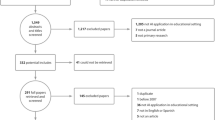Abstract
Innovative educational technologies have started to open new ways of interacting with students with special educational needs (SEN). Amongst the most effective approaches during the last decade (2001-2010) are those based on Artificial Intelligence (A.I.) techniques. The effective application of A.I. methods is seen as a means of improving the quality of life of SEN learners. Hence, a need for introducing A.I. techniques arises in order to develop both diagnosis and intervention processes. This paper presents a brief overview of the most representative studies of the past ten years, used for the above purposes.
Access this chapter
Tax calculation will be finalised at checkout
Purchases are for personal use only
Preview
Unable to display preview. Download preview PDF.
Similar content being viewed by others
References
Russell, S.J., Norvig, P.: Artificial Intelligence: A Modern Approach, 2nd edn., New Jersey (2003)
Lanzilotti, R., Roselli, T.: An Experimental Evaluation of Logiocando, an Intelligent Tutoring Hypermedia System. International Journal of Artificial Intelligence in Education 17, 41–56 (2007)
Wu, T.K., Meng, Y.R., Huang, S.C.: Application of Artificial Neural Network to the Identification of Students with Learning Disabilities. In: International Conference on Artificial Intelligence, pp. 162–168 (2006)
Public Law, Individuals with Disabilities Education Act (IDEA), USA, pp. 101–476 (1990)
Nanni, L., Lumini, A.: Ensemble generation and feature selection for the identification of students with learning disabilities. Expert Systems with Applications 36, 3896–3900 (2008)
Georgopoulos, V.C., Malandraki, G.A., Stylios, C.D.: A fuzzy cognitive map approach to differential diagnosis of specific language impairment. Artificial Intelligence in Medicine 29, 261–278 (2003)
Rebolledo-Mendez, G., De Freitas, S.: Attention modeling using inputs from a Brain Computer Interface and user-generated data in Second Life. In: The Tenth International Conference on Multimodal Interfaces (ICMI 2008), Crete, Greece (2008)
Rebolledo-Mendez, G., Dunwell, I., Martínez-Mirón, E.A., Vargas-Cerdán, M.D., de Freitas, S., Liarokapis, F., García-Gaona, A.R.: Assessing NeuroSky’s Usability to Detect Attention Levels in an Assessment Exercise. In: Jacko, J.A. (ed.) HCI International 2009, Part I. LNCS, vol. 5610, pp. 149–158. Springer, Heidelberg (2009)
Arthi, K., Tamilarasi, A.: Prediction of autistic disorder using neuro fuzzy system by applying ANN technique. International Journal of Developmental Neuroscience 26, 699–704 (2008)
Hernadez, J., Mousalli, G., Rivas, F.: Expert System for the Diagnosis of Learning Difficulties in Children’s Basic Education. In: Proceedings of the 8th WSEAS International Conference on Applied Computer and Applied Computational Science, Italy (2008)
Hernadez, J., Mousalli, G., Rivas, F.: Learning Difficulties Diagnosis for Children’s Basic Education using Expert Systems. WSEAS Transactions on Information Science and Applications 7(6) (2009)
Jain, K., Manghirmalani, P., Dongardive, J., Abraham, S.: Computational Diagnosis of Learning Disability. International Journal of Recent Trends in Engineering 2(3) (2009)
Kohli, M., Prasad, T.V.: Identifying Dyslexic Students by Using Artificial Neural Networks. In: Proceedings of the World Congress on Engineering, London, U.K, vol. 1 (2010)
Anuradha, J., Tisha, Ramachandran, V., Arulalan, K.V., Tripathy, B.K.: Diagnosis of ADHD using SVM algorithm. In: Proceedings of the Third Annual ACM Bangalore Conference (2010)
Melis, E., Andres, E., Budenbender, J., Frischauf, A., Goguadze, G., Libbrecht, P., Pollet, M., Ullrich, C.: ACTIVEMATH, A Generic and Adaptive Web-Based Learning Environment. International Journal of Artificial Intelligence 24(4), 1–25 (2001)
Libbrecht, P., Melis, E.: Methods to Access and Retrieve Mathematical Content in ActiveMath. In: Iglesias, A., Takayama, N. (eds.) ICMS 2006. LNCS, vol. 4151, pp. 331–342. Springer, Heidelberg (2006)
Melis, E., Siekmann, J.: ActiveMath: An Intelligent Tutoring System for Mathematics. In: Rutkowski, L., Siekmann, J.H., Tadeusiewicz, R., Zadeh, L.A. (eds.) ICAISC 2004. LNCS (LNAI), vol. 3070, pp. 91–101. Springer, Heidelberg (2004)
Schipor, O.A., Pentiuc, S.G., Schipor, M.D.: Improving computer based speech therapy using a fuzzy expert system. Computing and Informatics 22, 1001–1016 (2003)
Riedl, M., Arriaga, R., Boujarwah, F., Hong, H., Isbell, J., Heflin, L.J.: Graphical Social Scenarios: Toward Intervention and Authoring for Adolescents with High Functioning Autism. In: Virtual Healthcare Interaction, Papers from the AAAI Fall Symposium (2007)
Drigas, A.S., Kouremenos, D., Vrettaros, J.: Teaching of English to Hearing Impaired Individuals Whose Mother Language Is the Sign Language. In: Lytras, M.D., Damiani, E., Tennyson, R.D. (eds.) WSKS 2008. LNCS (LNAI), vol. 5288, pp. 263–270. Springer, Heidelberg (2008)
Gonzalez, C.S., Guerra, D., Sanabria, H., Moreno, L., Noda, M.A., Bruno, A.: Automatic system for the detection and analysis of errors to support the personalized feedback. Expert Systems with Applications 37, 140–148 (2010)
Baschera, G.M., Gross, M.: Poisson-Based Inference for Perturbation Models in Adaptive Spelling Training. International Journal of Artificial Intelligence in Education 20, 1–31 (2010)
Author information
Authors and Affiliations
Editor information
Editors and Affiliations
Rights and permissions
Copyright information
© 2013 Springer-Verlag Berlin Heidelberg
About this paper
Cite this paper
Drigas, A.S., Ioannidou, RE. (2013). A Review on Artificial Intelligence in Special Education. In: Lytras, M.D., Ruan, D., Tennyson, R.D., Ordonez De Pablos, P., García Peñalvo, F.J., Rusu, L. (eds) Information Systems, E-learning, and Knowledge Management Research. WSKS 2011. Communications in Computer and Information Science, vol 278. Springer, Berlin, Heidelberg. https://doi.org/10.1007/978-3-642-35879-1_46
Download citation
DOI: https://doi.org/10.1007/978-3-642-35879-1_46
Publisher Name: Springer, Berlin, Heidelberg
Print ISBN: 978-3-642-35878-4
Online ISBN: 978-3-642-35879-1
eBook Packages: Computer ScienceComputer Science (R0)




